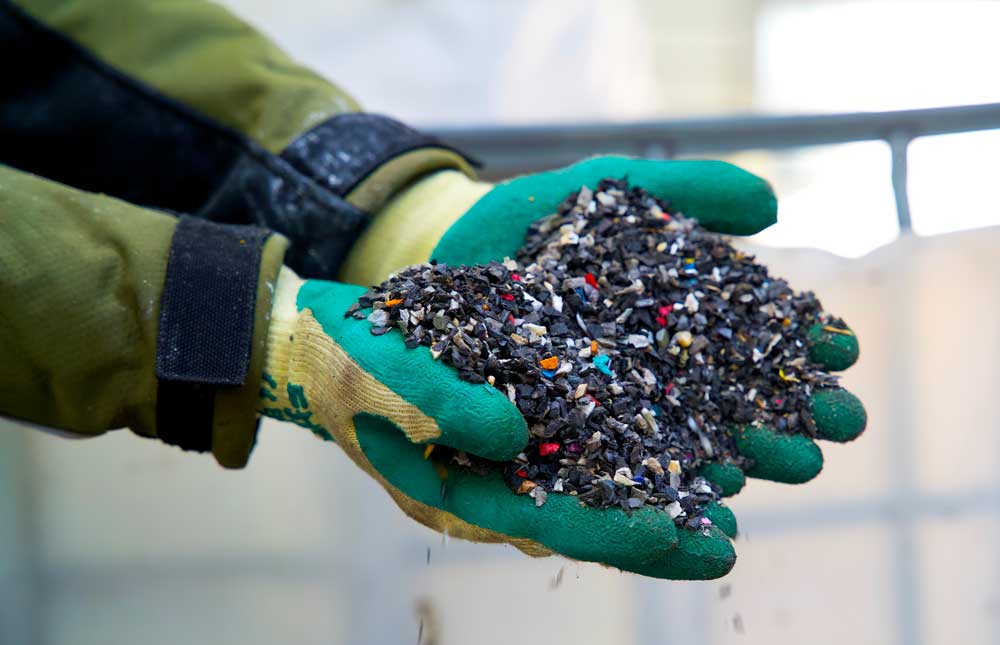Polypropylene, a widely used plastic in battery casings, has historically posed significant recycling challenges due to contamination and composition complexity. Through recent advancements, GME has developed an innovative recycling plant, implementing efficient processes to shred, wash, decontaminate, and separate polypropylene from lead-acid batteries. With the use of advanced sorting techniques, including wavelength-based color detection, GME achieves a purity level of <200 ppm of lead in its output. This material is then available as PP Chips (approximately 10mm) and PP Granules (approximately 1mm), supporting the production of new items across various industries. This paper provides an in-depth exploration of the recovery process and highlights GME’s contributions to sustainability and circular economy goals.
What is Polypropilene (PP)
Polypropylene (PP) is a versatile thermoplastic polymer found in an array of products, particularly in battery casings due to its durability and resistance. However, recycling polypropylene from lead-acid batteries has been challenging. As environmental demands and regulations intensify, the need for effective recycling methods is critical. This study examines innovations in polypropylene recovery and highlights GME’s efforts in creating a sustainable process to recover high-purity recycled polypropylene.
Problem Statement
Recycling polypropylene from lead-acid batteries requires solutions for complex challenges:
- Contamination: Lead and impurities in battery casings must be removed to yield high-quality recycled polypropylene.
- Complex Composition: Battery casings’ heterogeneous materials necessitate advanced sorting techniques.
- Environmental Impact: Polypropylene disposal contributes significantly to environmental pollution.
Objectives
- Develop an effective recycling process for polypropylene in lead-acid batteries.
- Achieve high purity levels in recycled polypropylene, ensuring usability and safety.
- Produce multiple polypropylene forms (PP Chips and PP Granules) for a wide range of industrial applications.
- Contribute to sustainability by reducing plastic waste and conserving resources within a circular economy framework.
GME’s Innovative Recycling Process
Shredding, Washing, and Decontamination
The first stage of GME’s recycling process involves shredding battery casings into manageable pieces. These pieces then undergo thorough washing and decontamination to achieve a lead purity level below 200 ppm, essential for safe industrial reuse. The purified polypropylene is a robust alternative to virgin plastics, minimizing environmental hazards.
Advanced Sorting and Separation Techniques
To efficiently isolate polypropylene components, GME employs sophisticated sorting technologies, including wavelength-viewer-based color detection, to accurately identify and segregate polypropylene. This color detection technology enhances the final product quality, ensuring only pure polypropylene is selected for recovery.
Output Products: PP Chips and PP Granules
The purified polypropylene emerges from GME’s plant in two forms:
- PP Chips: approximately 10mm in size, these chips are color-sorted and ideal for industries requiring bulkier polypropylene.
- PP Granules: at around 1mm, these granules are used in injection molding, making them perfect for the production of new plastic products, including battery casings.
Benefits of GME’s Polypropylene Recycling Plant
Environmental Impact
GME’s plant reduces landfill-bound plastic by recycling polypropylene from lead-acid batteries, mitigating the environmental effects of improper disposal and conserving land space.
Resource Conservation
This recycling process lowers the demand for virgin plastics, conserving valuable resources. Supporting a circular economy, GME’s process reuses materials that would otherwise contribute to environmental degradation.
Economic Advantages
Recycled polypropylene is a cost-effective resource for various industries, reducing production expenses associated with new plastic creation. GME’s recycled products enable companies to align with sustainable manufacturing practices without compromising quality.
Applications of Recycled Polypropylene
The applications for GME’s high-quality, recycled polypropylene are extensive:
- Battery Casings: purified recycled polypropylene can be manufactured into new, durable battery casings, reducing the environmental impact of new plastic production.
- Automotive Parts: the strength and versatility of recycled polypropylene make it suitable for automotive components, supporting the industry’s sustainability efforts.
- Consumer Goods: the recycled polypropylene can be molded into containers, packaging, and household items, extending its use across multiple sectors.
GME’s innovative recycling of polypropylene from lead-acid battery scrap represents a pivotal development in the recycling industry. By achieving high purity levels and producing polypropylene in two versatile forms, GME promotes a sustainable approach that benefits the environment, conserves resources, and supports circular economy goals. This model showcases the power of technological innovation in creating efficient recycling systems, underlining the essential role of sustainable practices in modern industry.
Comments are closed.

